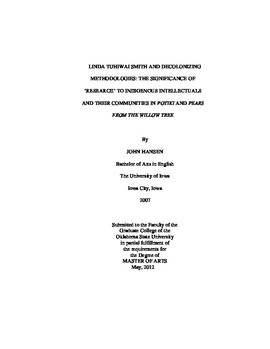| dc.contributor.advisor | Smith, Lindsey Claire | |
| dc.contributor.author | Hansen, John | |
| dc.date.accessioned | 2014-04-15T22:30:01Z | |
| dc.date.available | 2014-04-15T22:30:01Z | |
| dc.date.issued | 2012-05-01 | |
| dc.identifier.uri | https://hdl.handle.net/11244/9515 | |
| dc.description.abstract | An examination of Tangimoana from Patricia Grace's Potiki and Seb from Violet Dias Lannoy's Pears from the Willow Tree reveals how Indigenous intellectuals utilize their Western education to assist their respective communities. Through their Western schooling, each protagonist engages in acts that reacquire history and power that has been stolen or altered by prevailing groups. When juxtaposed with one another, an application of Linda Tuhiwai Smith's decolonizing methodologies to a postcolonial text or a postcolonial lens used to analyze a Maori text uncovers several strengths and weaknesses. Each theoretical lens attempts to recover Indigenous peoples' stories, history, language, or culture. The two theories empower Indigenous peoples by allowing them to rewrite the past and extend such knowledge to others in their own community. These concepts possess an ability to reveal a consciousness to utilize Western education as a means to resist attacks on Indigenous societies by prevailing groups. Scholars of postcolonial studies and Indigenous studies often disagree with one another's approach concerning the relationship between Indigenous peoples and the influences of Western culture and society. In particular, the institutionalization of Indigenous studies into educational academies forces a closer examination of Western education and Indigenous peoples. However, postcolonial and Indigenous studies can systematically work in conjunction with one another. That is, each theoretical lens communicates tensions that arise amongst the colonized and non-colonized groups. This essay explores how Indigenous peoples use their newfound knowledge of Western academics alongside their understanding of their own culture to benefit individuals in the Indigenous community. As it stands, the term "research" in Linda Tuhiwai Smith's Decolonizing Methodologies: Research and Indigenous Peoples becomes problematic at times and is expanded to embody any act by an Indigenous person that strives to recover history, culture, language, and writing. If Indigenous peoples gain control of such areas then they can mitigate unscrupulous practices and lessen vicious cycles of biased scholarship that is written about them. These acts of reclamation ultimately allow Indigenous peoples to recover their original identities. Countless researchers implement these methods and inevitably undermine communities of Indigenous peoples throughout the world. By continuing to recognize and debate what the term "research" should represent, Indigenous peoples can begin to utilize Western education, and more importantly, acts of research, to help sustain their own communities. | |
| dc.format | application/pdf | |
| dc.language | en_US | |
| dc.publisher | Oklahoma State University | |
| dc.rights | Copyright is held by the author who has granted the Oklahoma State University Library the non-exclusive right to share this material in its institutional repository. Contact Digital Library Services at lib-dls@okstate.edu or 405-744-9161 for the permission policy on the use, reproduction or distribution of this material. | |
| dc.title | Linda Tuhiwai Smith and Decolonizing Methodologies: the Significance of `research' to Indigenous Intellectuals and Their Communities in Potiki and Pears from the Willow Tree | |
| dc.type | text | |
| dc.contributor.committeeMember | Eldevik, Randi | |
| dc.contributor.committeeMember | Mayer, Robert | |
| osu.filename | Hansen_okstate_0664M_11964.pdf | |
| osu.college | Arts and Sciences | |
| osu.accesstype | Open Access | |
| dc.description.department | English Department | |
| dc.type.genre | Thesis | |
| dc.subject.keywords | decolonizing methodologies | |
| dc.subject.keywords | indigenous studies | |
| dc.subject.keywords | linda tuhiwai smith | |
| dc.subject.keywords | pears from the willow tree | |
| dc.subject.keywords | postcolonial | |
| dc.subject.keywords | potiki | |
